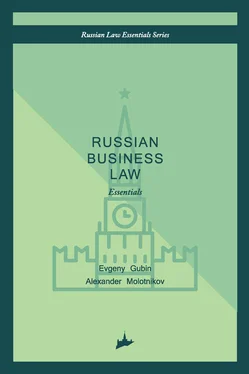The president of Russia issues acts of two types: decrees and orders. [21] Additionally, this type of an act of the President of Russia as an assignment/order has recently been widely adopted. The orders of the President do not contain norms obligatory for legal entities and citizens. These documents contain provisions obligatory for subordinate governmental authorities reflecting, as a rule, the most accurate directions of the development of the legislation and the state policy in general. An understanding of some orders of the President of Russia can be useful for entrepreneurs.
As a rule, orders, unlike decrees, do not possess a normative character. Currently, the President of Russia has issued a few acts which regulate entrepreneurial activities.
5.1.2. Acts of the Government of the Russian Federation
The Government of Russia issues decisions and orders. They should not contradict the Constitution of Russia, federal laws, and decrees of the President of Russia (Article 115 of the Constitution of the Russian Federation).
5.1.3. Acts of the Ministries
The federal ministries adopt acts (generally those are commands and orders), on the basis and in accordance with the Constitution of Russia, the federal laws, the acts of the President and the Government of Russia.
5.1.4. Acts of Federal Agencies and Services
In the Russian Federation, all federal executive authorities, except for the Government of Russia and the Ministries, are two types: agencies and services. Agencies carry out the functions of providing state services, of management of the state property, and law-enforcement functions. The main function of the services is the exercising of control and supervision in the established field of activity. Both agencies and services issue law-enforcement acts, as well as normative legal acts in certain cases.
Federal agencies and services issue a large number of legal acts, which regulate some issues of entrepreneurial activities in detail.
5.2. Other Subordinate Legal Acts
Apart from government bodies, the power of adoption of obligatory acts in Russia is possessed by such formations of sui generis, including:
5.2.1. Central Bank of the Russian Federation (Hereafter CBR)
The CBR carries out the regulation of banking activities, the financial markets, monetary, and currency regulation. Thus, the Bank of Russia in particular establishes the rules of the implementation of calculations within the Russian Federation, rules on carrying out banking operations, exercises regulation, control, and supervision in the sphere of the corporate relations in joint stock companies, defines the procedure of calculations with international organizations, foreign states, as well as with legal entities and individuals.
On matters relevant to the CBR Law and other federal laws, the Bank of Russia issues normative acts in the form of orders, rules, and instructions that are obligatory for federal public authorities, public authorities of the subjects of the Russian Federation, local authorities, individuals, and all legal entities.
5.2.2. State Corporations
State corporations, being structures of sui generis, can be provided with various powers, including powers on the adoption of normative legal acts (see, for example, Article 8 of FL on Rosatom).
Thus, Rosatom State Corporation on Atomic Energy adopted an order No. 1/19-NPA (as of December 6, 2013), which stipulates the obligatory forms of reports in the field of state registration and control over radioactive materials and radioactive waste, as well as the order and terms of providing reports.
6. Acts of the Subjects of the Federation
So far we have addressed only the federal legislation, that is the acts which are adopted by government authorities at the level of the federation. The subjects of the Russian Federation have the right to adopt legal acts on the matters listed in Article 72 of the Constitution, as well as on any other matters, except for those listed in Article 71 of the Constitution.
Russia is an asymmetric federation; it is composed of different types of subjects. There are six such types in total: the republics (the republic is a name of the subject of a part of Russia), the territories, the regions, the cities of federal importance, the autonomous region, and the autonomous areas. The subjects of all types possess almost identical legal status.
There are three cities of federal importance in Russia: Moscow, St. Petersburg, and Sevastopol. The aforementioned cities are separate subjects of the federation and, respectively, their bodies adopt legal acts of regional level.
6.1. The Competence of the Subjects of the Federation
According to Article 72 of the Constitution of the RF, the subjects of federation can adopt legal acts, particularly on the following matters:
i) possession, use and disposal of land, subsoil, water and other natural resources;
ii) demarcation of state property;
iii) nature utilization, protection of the environment and ensuring ecological safety; specially protected natural territories;
iv) establishment of common principles of taxation and levies in the Russian Federation;
v) administrative, administrative procedure, labor, family, housing, land, water, and forest legislation; legislation on subsoil and environmental protection.
Moreover, subjects of the federation can adopt legal acts on any other matter, except for those listed in Article 71 of the Constitution of the RF.
6.2. The System of Acts of the Subjects of Federation
6.2.1. Constitution (charter) of the Federation Subject
The system of legal acts of each subject of the federation also represents a pyramid, at the top of which is the charter or the constitution of the subject.
6.2.2. Laws of the Subject of the Federation
Thereafter, the laws of the subject of federation are located. The laws of the subjects often play an important role in the legal regulation of entrepreneurial activities in the given region. Thus, in many subjects, separate laws (codes) on administrative offenses are adopted. These laws provide sanctions for offenses. Moreover, the laws of the subjects establish the structures of administrative offenses which are not provided by the Code of Administrative Offences of the RF.
Such an act in Moscow is the Law of Moscow city No. 45 (as of November 21, 2007), "The Code of the City of Moscow on Administrative Offenses." In particular, it provides liability for such offenses, such as:
i) the implementation of small retail trade without documents confirming the right to placement of trade objects;
ii) illegal destruction of green plantations;
iii) excess in terms of design of the objects, and other excesses.
Moreover, in many subjects of the federation, legal acts are adopted with the purpose of supporting of small and medium businesses. The Law of City of Moscow No. 60 (as of November 26, 2008), "On Support of Small and Medium Businesses in the City of Moscow," is such an act in Moscow. This law regulates, in particular:
i) the procedure for providing to the subjects of small and medium businesses property, financial, information, consulting, legal, and other types of support (chapter 4 of the law);
ii) the procedure for rendering additional support to the subjects of small and medium businesses, which are carrying out activities in the field of innovation, industrial production, and other spheres (chapter 6 of the law).
The subjects of the federation adopt another set of laws, somehow affecting the interests of entrepreneurs.
Читать дальше












